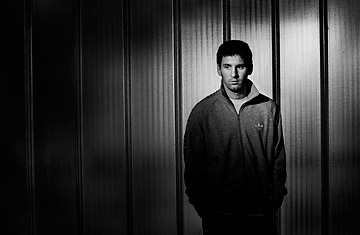
Lionel Messi of FC Barcelona, photographed Jan. 11, 2012
(2 of 3)
In contrast, his collection of honors for FC Barcelona reflects that team's ascension to the greatest on the planet. With Messi as its talisman, Barca, as the club is known, has redefined what can be done on a football field, playing a highly intricate passing game that leaves rivals mesmerized and vulnerable to the darting, goal-bound runs of its forwards.
Since Messi joined the first XI in 2004, Barca (pronounced Bar-sa) has thrice won the UEFA Champions League, the greatest contest in professional football. Barca has also won La Liga, Spain's domestic league, five times. And it has claimed two UEFA Super Cups, two FIFA Club World Cups and an assortment of lesser trinkets. No other club has accumulated as many trophies in that period. (Full disclosure: I have been a Barca partisan since early youth.)
And although the club has a constellation of top talent — eight members of the Spanish team that won the 2010 FIFA World Cup in South Africa play for Barca — it is Messi's goals that bring in the silverware. He has banged in 212 in 295 appearances, not including friendlies, a strike rate of 0.72 per game in a sport in which anything approaching 0.50 is regarded as brilliant. His closest rival, the Portuguese striker Cristiano Ronaldo, who plays professionally for Barca's archrival Real Madrid, has 237 goals in 411 games, a strike rate of 0.58. But what makes Messi unique among top goal getters is that he also creates scoring opportunities for others because he inevitably attracts so much defensive attention. His passing skill has produced 76 assists in his 295 appearances, a ratio exceeded only by a handful of midfielders, whose main job is to assist.
And then there are the "oh my God" goals: beating four of Real Madrid's high-priced defenders in a flash; flicking the ball past Arsenal's befuddled keeper Manuel Almunia; collecting a pass at midfield against Getafe in 2007 and beating one player twice and three others before rounding the keeper to score. "I look at him, and he does at least three or four things in every game that I never did in my whole career," says Gary Lineker, one of England's most successful strikers. Former England manager Terry Venables, who coached Barcelona in the 1980s, adds, "It's not possible, what he does." Some great players, like Cristiano Ronaldo, have blinding speed; others, like the late Irish wizard George Best, are brilliant improvisers; still others, like Germany's 1970s star Gerd Müller, have the knack of always being in the right place. Messi has all three gifts in generous proportions. He also has the ability to harness them in the biggest games, when he is under the most extreme pressure. He has scored twice in Champions League finals and 13 times in 17 games against Real Madrid in one of football's fiercest contests.
If Messi is otherworldly when playing in the blue and claret of Barca, why are his stats in the sky blue and white of the Argentine national team more human at just 0.29 goals per game? Argentina's chaotic football politics is part of the problem. Since Messi's debut, the national team has been run by a number of coaches (including, during the 2010 World Cup, the iconic Diego Maradona). Each has preferred a style very different from Barca's. While his club allows him freedom to roam on the pitch, the national team — which has other world-class goal scorers in Carlos Tevez and Sergio Aguero — has mostly confined Messi to the right wing, allowing him fewer opportunities to strike. And few of his national teammates have the discipline and work ethic that are Barca's hallmarks. Juan Roman Riquelme, the team's playmaker, put it best when he declared, "Argentina is Messi without Barcelona, and Spain is Barcelona without Messi."
But to many ordinary Argentine fans, Messi's relatively mediocre goal-scoring record for the national team suggests that he puts club ahead of country, that he simply doesn't play as hard for Argentina. By their reckoning, he is more Catalonian than Argentine.
The accusation cuts deeply. "[Critics] said things that weren't true, that I didn't care as much about wearing the [Argentine] shirt," he says. The topic brings out genuine emotion in Messi, who is known to be cautious to the point of blandness. "I've never stopped being Argentine, and I've never wanted to," he says. Teammates and club officials vouch for his patriotism: they point out that his accent remains unchanged since he first arrived in Spain from Rosario and that he barely speaks any Catalan, the language of Catalonia. (Ironically, some Barca fans fault him for failing to adapt to the ways of his adopted home.) He drinks endless quantities of maté, which is to Argentines what tea is to the English, and is partial to churrasco grilled-meat cookouts, another favorite national pastime. Even his girlfriend, Antonella Rocuzzo, is from his hometown. "He is the most Argentinian of Argentines," says Guillermo Amor, the club's director of football training. "He's strongly rooted to his barrio [neighbourhood] in Rosario."
National teammates too can sympathize with Messi's predicament. Tevez, no stranger to criticism, lashed out in a recent interview: "Everything is always Messi's fault. And he's the best player in the world. Imagine how he must feel in his head!" Indeed, the lack of affection often hangs over Messi like a dark cloud, especially after a losing game. Carlos Bilardo, who coached Argentina to victory in the 1986 World Cup and is now general manager of the national team, recalls one postgame episode in which Messi broke down in uncontrollable tears in the dressing room. "He was just crying and crying and crying, and he couldn't stop," Bilardo says. "[Forward] Diego Milito came to ask me what to do, and I told him to just let him keep crying. That's how much he loves Argentina."
